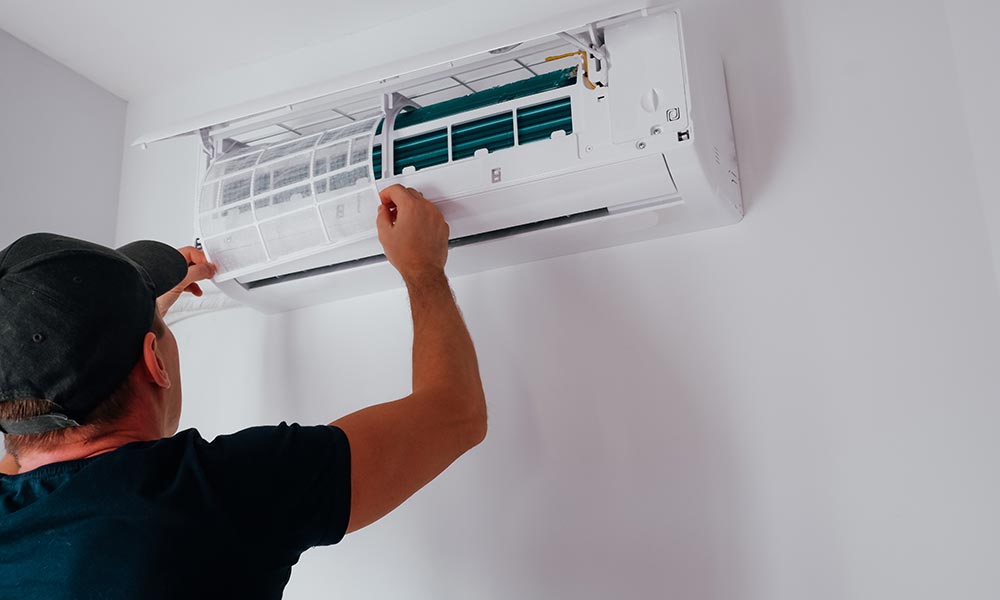During the long summer months, keeping your air conditioning unit running smoothly becomes a top priority. A well-maintained AC not only ensures cool and comfortable living but also operates more efficiently, saving you money on your energy bills. Regular upkeep is a crucial part of this maintenance, so today, we’re detailing what you need to know when cleaning an AC unit.
The Importance of Cleaning an AC Unit
Think of your AC unit as a tireless worker, diligently removing heat from your home throughout the summer. However, just like any hard worker, it needs some TLC to function at its best. Here’s why cleaning your AC unit is important:
Improved Efficiency
Over time, dust, dirt, and debris can accumulate on the condenser coils located outside your unit. This acts like a blanket, hindering the unit’s ability to release heat effectively. Cleaning the condenser coils allows for proper heat exchange, improving efficiency and lowering energy consumption.
Extended Lifespan
A clogged and dirty AC unit works harder to maintain desired temperatures, increasing strain on the system. Regular cleaning prevents this strain, extending the unit’s lifespan and saving you the cost of premature replacement.
Enhanced Comfort
A clean AC unit operates smoothly, delivering consistent and reliable cooling throughout your home. By removing dirt and debris, you ensure optimal airflow and prevent any issues that could lead to uneven cooling or a weakened cooling effect.
Reduced Risk of Breakdowns
Regular cleaning helps identify potential problems early on. During cleaning, you might notice damaged fins, loose parts, or signs of wear and tear. Addressing these issues promptly can prevent minor problems from escalating into major breakdowns.
Your Step-by-Step Guide to Proper Care
Now that you understand the benefits of cleaning an AC unit, let’s break down the steps involved.
- Safety First: Before you begin, always turn off your AC unit at the thermostat and disconnect the power supply. This prevents any accidental electrical shock.
- Clear the Area: Remove any plants, furniture, or debris surrounding the outdoor unit. This allows for proper access and airflow.
- Gently Remove Debris: Use a soft brush or a vacuum cleaner with a hose attachment to carefully remove any leaves, twigs, or other loose debris from the condenser coils. Avoid bending the delicate fins.
- Rinse the Coils (Optional): If the condenser coils are heavily soiled, gently spray them with a garden hose using a low-pressure setting. Work your way from the inside out to flush out dirt or dust. Let the coils dry completely before turning the unit back on. When hiring a professional HVAC contractor, we use different methods, such as condenser coil cleaners.
- Clean the Fins (if needed): Self-cleaning the fins requires a gentle touch. If the unit is making noise before turning off, it’s a sign that the fins on the condenser coils are bent. This is a very delegated process, and an HVAC contractor is recommended.
- Replace the Air Filter: A clean air filter is essential for optimal airflow and indoor air quality. Check your air filter monthly and replace it according to the manufacturer’s recommendations, typically every one six months, depending on the size and quality of the filter.
When to Call the Experts
While regular cleaning is important, there are times when professional intervention is necessary. Look out for warning signs that require a qualified HVAC technician’s expertise. These include extensive coil damage, where severe bending or corrosion could worsen during cleaning. Additionally, a hissing sound or a decline in cooling performance might indicate a refrigerant leak, which requires a trained professional for safe and proper repair. Finally, any electrical issues, like flickering lights or strange noises during operation, should prompt you to contact a qualified electrician to avoid potential hazards.
Keep Cool With Bend Heating
Cleaning an AC unit with the above steps will help your system operate efficiently, keeping your home cool and comfortable all summer. Plus, a well-maintained unit translates to lower energy bills and a longer system lifespan. For any questions or concerns, Bend Heating & Sheet Metal is here to help.
